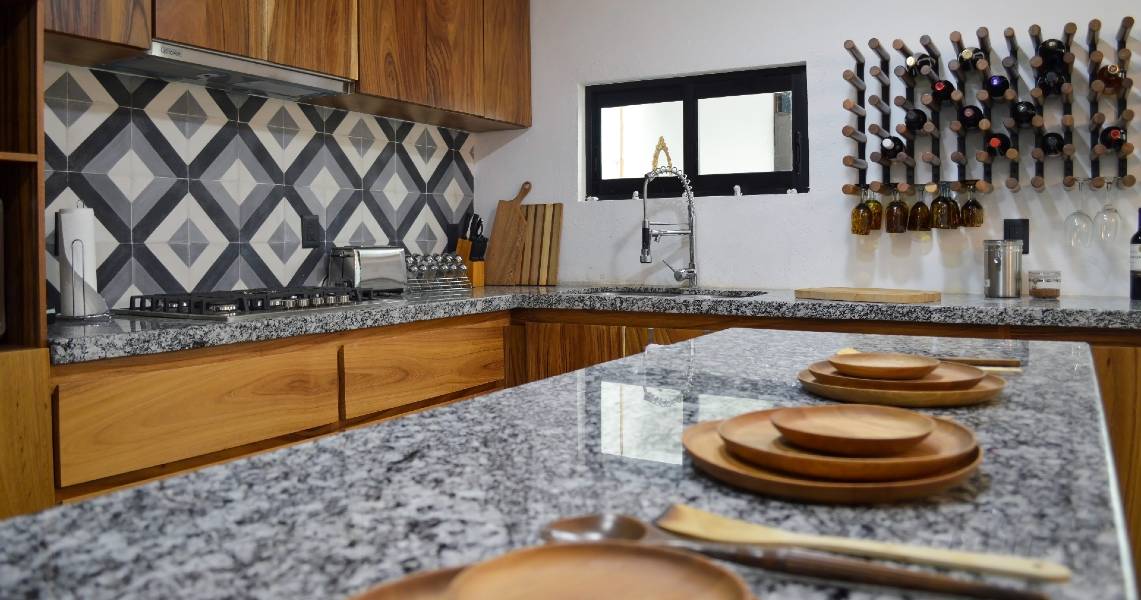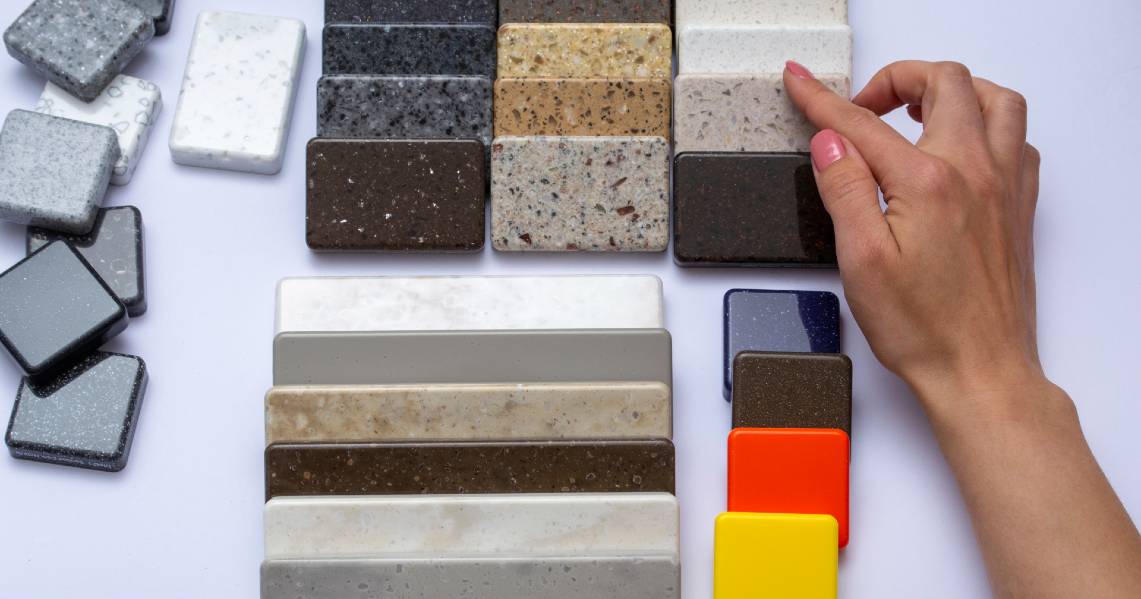If you’re contemplating a home renovation, you might be debating between quartz and granite for your kitchen countertops. Maybe you have a preference but are curious about what sets these two materials apart. Key distinctions lie in their looks, makeup, longevity, cost, and upkeep requirements.
This piece explores and breaks down the nuances differentiating quartz and granite countertops. Ultimately, it equips you with the knowledge to make an informed choice.

Appearance
One of the first differences between quartz and granite is their colors and patterns. Granite is a 100% natural stone obtained directly from the quarry and, therefore, has a more natural appearance than its engineered counterpart, quartz. Granite comes in infinite colors and patterns. No two granite countertops are the same. So, you’ll typically always have a unique granite countertop. If you want to stand out, perhaps this is the countertop material.
On the other hand, quartz is an engineered stone with a more uniform appearance. It looks pretty much like a natural stone countertop (although some people consider it better) and allows homeowners to customize the design to their taste.
Since granite comes in so many colors and patterns, finding one suitable for your kitchen decor may take some time. Finding one suitable for quartz is much easier.
Composition
Granite is formed by cooling and solidifying molten materials, then cutting them into thin slabs, polished, and fabricated. It is a purely natural stone.
Quartz countertops are an engineered material; however, a large part of their composition comprises natural quartz. Natural resins and crushed rocks make up the remaining part.
Cost
Quartz and granite are both premium countertop materials, but their prices vary. Quartz countertops are more expensive than granite countertops. However, the price difference is pretty small, and if you’re on a budget, neither of them might be the right choice for your home improvement project.
Home Advisor says granite countertops, on average, cost between $2,250 and $4,500 to buy and install. Quartz, on the other hand, can cost between $3,000 and $7,500.
You can save money by doing preliminary work, but you would need a professional installer for the fabrication and installation.
Durability
Durability is one differentiating factor between quartz and granite. Although both are highly durable, quartz seems to win in this regard.
Granite is durable and highly resistant to heat—in fact, it’s one of the most heat-resistant kitchen countertops known. However, it is a bit porous, so staining isn’t uncommon. Staining can easily occur if spilled liquids are left on the surface for a long time without wiping. When there are stains, your countertop may no longer look as visually appealing as it did when it was first installed. However, you can avoid staining by sealing granite. This will keep its porous nature hidden.
Thanks to its non-porous nature, quartz is more durable than granite. This property also makes it resistant to bacteria and staining.
Quartz is so hard that it’s practically indestructible. No cracking whatsoever unless you’re thinking of bringing in some sledgehammer to your kitchen. But where it falls behind granite is in the area of heat resistance.
Quartz is not as resistant to heat as granite, so you would have to place a heating pad underneath pots as you remove them from the stove or oven, unlike granite.

Maintenance
Since granite isn’t resistant to staining, it typically requires more stringent maintenance. It’s best to clean spills immediately. After cooking, clean granite countertops by wiping the surface with mild soap and water. Cleaning should be done as frequently as possible to prevent oil from causing stains the longer it stays on the surface. However, a regular cleaning routine may be challenging when life gets busy.
Note that granite may harbor bacteria since it’s porous, so you might want to use some disinfectant occasionally.
However, you can ease up maintenance of by sealing your granite countertop. This covers up its pores, reducing its susceptibility to bacteria and stain. If you’re sealing granite at installation, consider resealing it yearly. Unfortunately, that’s a maintenance routine many people may find expensive in the long run.
On the other hand, quartz maintenance begins and ends with cleaning with mild soap and water. There is no need for sealing since it’s as solid as can be.
Although considered heat-resistant, quartz countertops are worrisome when exposed to hot pans. Using heating pads is, therefore, crucial for maintaining quartz countertops.
You may also like Exciting Bathroom Design and Remodeling Ideas with Granite.
Granite and Quartz: Pros and Cons at a Glance
Granite Pros
- It has a distinctive natural appearance
- Every granite slab is unique
- Highly resistant to heat
- A bit less pricey than quartz
Granite Cons
- Not very resistant to staining, moisture, and bacteria
- Being a natural stone, granite countertops contain visible seams
- Needs resealing yearly
- Vulnerable to cracking during transportation
- You can cut food on the surface without leaving visible scratches
Quartz Pros
- Uniform with no surface seams
- Highly resistant to bacteria, stains, and moisture
- No sealing required
- It’s easy to find a suitable option suitable for your kitchen decor
Quartz Cons
- Less resistant to heat
- Although highly stain-resistant, dark and dyed liquids may cause stains if not wiped immediately
- Cutting food on the countertop may lead to visible scratches
- Very pricey
- Very heavy; your kitchen cabinet may require some reinforcement to support the weight

Quartz Vs. Granite: Which is Better?
When considering which is best for your home, quartz or granite, it’s a matter of personal preference, so it’s really up to you. Both kitchen countertops have pros and cons, so it’s left for you to decide which you’re most comfortable with.
In many cases, though, quartz seems to be the winner. Quartz comes out top in terms of durability, maintenance intensity, and customization options. But if you’re considering the price and natural appearance, perhaps you’d be better off with a granite countertop. Weigh your options and needs and see which countertop works best. Contact Us Today.

